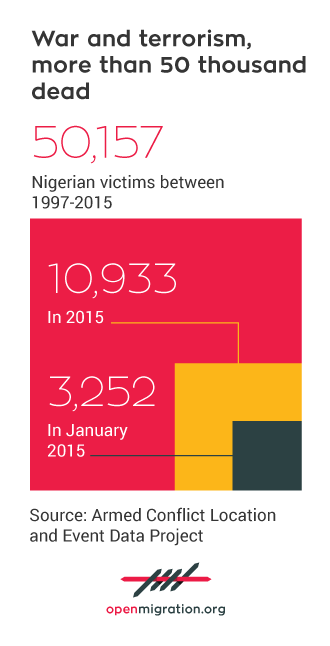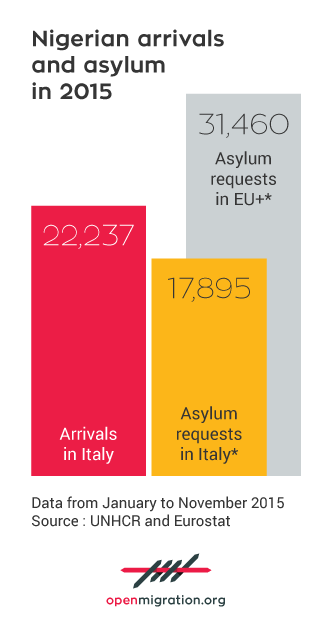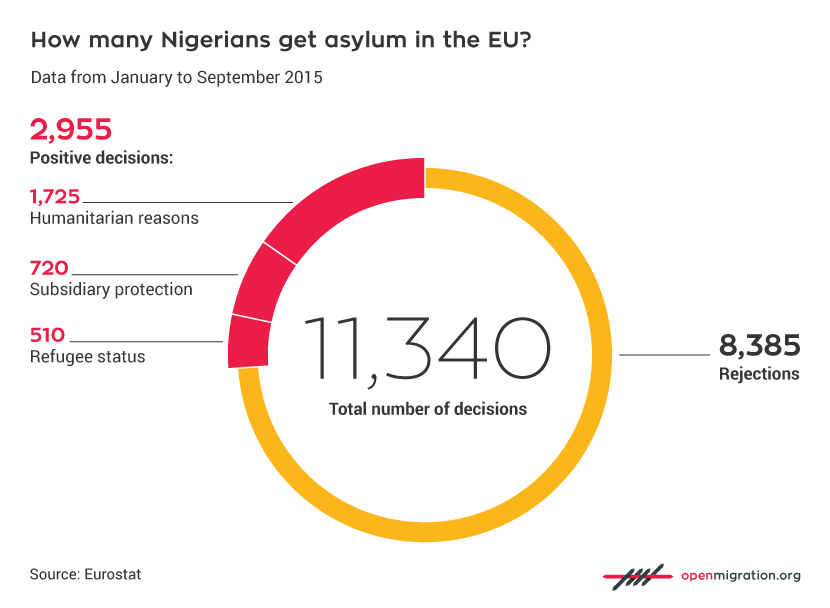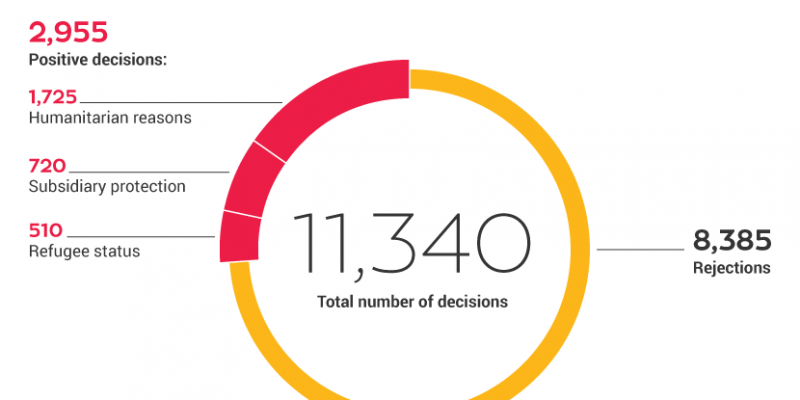The massacres by Boko Haram terrorists and by the national army, the extreme violence, the trafficking of women to Italy, the lack of trust in one’s country. There are many reasons to flee Nigeria, reasons that Europe often does not acknowledge. Many Nigerians arrive in Italy (they make up most of the asylum requests in our country), but if you disembark in Lampedusa and you give the wrong answer upon registration – «I’m here to work» – or if you come from the wrong region of the African country, your journey might just end there and then.
Below are five facts to better understand who they are and why they are leaving their country.
1. A war-torn country
According to the Armed Conflict Location and Event Data Project, between 1997 and late 2015 there were 50.157 fatalities (from car bombs, armed conflicts, etc.). In 2015 only there were 10.933 casualties, with “Black January” (3.252 fatalities) and the unprecedented massacre in Baga town where hundreds of people were killed.
were 50.157 fatalities (from car bombs, armed conflicts, etc.). In 2015 only there were 10.933 casualties, with “Black January” (3.252 fatalities) and the unprecedented massacre in Baga town where hundreds of people were killed.
2. A lack of trust
Among African countries, Nigeria ranks at the bottom for trust in the institutions (government, Parliament). A 2015 Afrobarometer poll shows that only 17.3 percent of Nigerians feel safe from political intimidation or violence, and 81.3 percent say they feel a little, somewhat or very much afraid.
63.1 percent of Nigerians are convinced that corruption plagues their current government and only 29 percent are “very satisfied or fairly satisfied” with the way democracy is working in their country. Even more significantly, 74 percent are convinced that Nigeria is headed in the wrong direction.
3. Nigerians and Italy
For Nigerians fleeing to Europe, Italy is the preferred country of destination.
According to the data available on a period of twelve months (December 2014 – November 2015), 31.460 Nigerians have requested asylum in Europe, with more than half of whom in Italy (17.895, or 57 percent). Between July and September 2015, a staggering 68 percent of Nigerians (7.575) who sought asylum in Europe did so in our country. In spite of this, and the high visibility they enjoy in Italy, the number of residents from Africa’s most populous country is still rather low: 71.158 by the end of 2014.
4. How to recognize the victims of human trafficking
The presence of victims of human trafficking is typical of the influx of Nigerian migrants into Europe and Italy. Women account for more than a fifth of all the asylum applications lodged in Italy; they are mostly teenagers or young women (generally girls between the age of 15 and 24).
According to a recent IOM report, «most of these women are targeted for sexual exploitation». Thousands of women who are victims of human trafficking arrived in Italy over the last few years from specific regions of Nigeria (the Benin City area and generally the Southern region of the country).
Here is the IOM checklist to recognize the victims of human trafficking
- gender (mostly women)
- age (often young or underage, between 15 and 24. Many claim to be of age despite evidence to the contrary)
- nationality (mostly Nigerians) and provenance (mostly Edo State, but also Delta State, Lagos State, Ogun State, Anambra State)
- place of departure (Edo State)
- low education levels
- they belong to impoverished families that struggle financially
- they are often the eldest of multiple children
- they claim to be orphans
- they have travelled free of charge
- they have difficulties telling about their journey, especially the final portion, from Libya to Italy
- when in group, they are the quietest and most demure
- they claim that they are joining a relative (sister or brother) or a friend in Italy or in Europe
- behavioural problems (aggression-introversion)
- obvious physical signs of violence/torture
5. Low recognition rates
Although many Nigerians crossing the Mediterranean are undoubtedly fleeing mortal danger, or at least violent exploitation, and are therefore entitled to protection under Article 1 of the 1951 Convention, their recognition and protection rates are low. Less than 5 percent of Nigerian migrants are granted refugee status in Europe, and overall about 25% are granted various forms of protection provided by each country’s legal system.
Twitter: @alessandrolanni









